by Andrew Willis Garcés and Mackenzie Baris, with contributions by many others
Read previous reports: 2009, 2008, 2007
In 2010, DC activists took action. As in previous years, they organized — demonstrations, concerts, fundraisers, walkouts, speakouts, sit-ins, hoop-ins, know-your-rights teach-ins, workshops, parties, outreach days, breakfast meeting invasions (VIDEO)… and they voted, too.
THE PEOPLE SAY “BYE” TO FENTY AFTER 4 YEARS OF RESISTANCE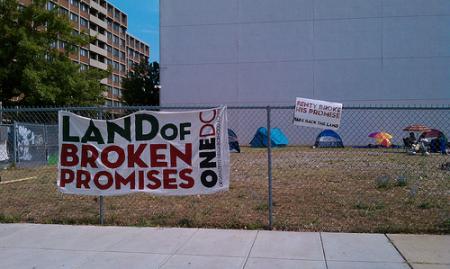
Perhaps the biggest people’s movement victory was the near-unanimous dismissal of Mayor Adrian Fenty and DCPS Chancellor Michelle Rhee by Democratic primary voters in September, four years after he swept every precinct in the city. Although many commentators spun a story of Fenty suddenly becoming “out of touch,” it’s clear that his lack of accountability to working families was pushed into the public spotlight by four years of collective resistance to his harmful policies.
Activists pushed back against his efforts to privatize land and property, from “surplussed” school buildings across the city to a public lot in Shaw (above) and a library in Foggy Bottom. They voiced loud opposition to his closure of 21 public schools, 13 childcare centers and two homeless shelters, and his improper layoffs of hundreds of public sector workers. Students marched and rallied against the attacks on their schools and the MPD’s proposed youth-criminalizing civil gang injunctions, which were defeated. Other anti-police brutality activists continue to seek justice for the murder of DeOnté Rawlings and others victimized by the police, and many demonstrated against the military-style police checkpoints setup in Trinidad. And over two years after Fenty mandated the switch, many residents have come to oppose the new time-and-distance taxi meter system, which has resulted in less income for nearly all drivers and prompted several taxi strikes.
Constant nightly news and radio reports and dozens more print and online articles and alternative media dispatches all documented the organized outrage of communities across the District over the last four years. Fenty was out of touch and unaccountable, yes, but more importantly, Chocolate City got organized.
INDEX
+ 2010 SNAPSHOT + Education & Youth + Immigrant Rights + Labor & Workers + Land & Housing + Safety Net Programs, Consumer Protection & Health Justice + CAMPAIGN STORY: A Campaign to Rebuild the Safety Net
2010 SNAPSHOT This report is just a snapshop of collective action in DC — we couldn’t capture it all. Like when Hardy Middle School students showed up to a City Council oversight hearing to denounce the reassignment of their principal, Patrick Pope. Or the Muslim women who won the right to wear hijab in their DC driver’s license photos. Before several Muslim women and the Council on American-Islamic Relations intervened, DC residents who wear hijab were routinely turned away from the DMV without licenses. And a stripper who performed at The House on Georgia Ave sued the club owner seeking back wages and overtime, alleging she had been wrongfully classified as an independent contractor. As noted below, strippers and sex workers are just some of those successfully fighting wage theft.
LOCAL TO GLOBAL And although the focus on this report is local, we want to note that hundreds of of DC residents routinely join nationwide solidarity demonstrations, like the summer-long protests standing with the people of Arizona (VIDEO) resisting racist laws, including some who interrupted a Nationals game against the Arizona Diamondbacks in August. And the Georgetown University students who in October served the former president of Colombia with a subpoena on behalf of survivors of state violence.  Several hundred locals also packed Plymouth Congregational United Church of Christ in May for the Greater DC People’s Assembly, just one stop for many who went on to continue building a united Left at the US Social Forum in Detroit the following month. It’s also important to note that we didn’t just struggle — we celebrated. At ONE DC’s Emancipation Day 150 Year Anniversary celebration (cosponsored with many others), the Washington Peace Center’s Activist Awards, and the Marbury Plaza Concerned Tenants Association 2nd Annual Tenant Choice Awards, to name just a few. We’re also happy to link to other reports of victories in collective struggle in the District, like this one published by Holla Back DC. Send ’em if you’ve got ’em. To a more just & organized 2011. To quote Head-Roc: “If you want to change your situation, join an organization.” -AWG & MB (dreamcityreport@gmail.com)
Several hundred locals also packed Plymouth Congregational United Church of Christ in May for the Greater DC People’s Assembly, just one stop for many who went on to continue building a united Left at the US Social Forum in Detroit the following month. It’s also important to note that we didn’t just struggle — we celebrated. At ONE DC’s Emancipation Day 150 Year Anniversary celebration (cosponsored with many others), the Washington Peace Center’s Activist Awards, and the Marbury Plaza Concerned Tenants Association 2nd Annual Tenant Choice Awards, to name just a few. We’re also happy to link to other reports of victories in collective struggle in the District, like this one published by Holla Back DC. Send ’em if you’ve got ’em. To a more just & organized 2011. To quote Head-Roc: “If you want to change your situation, join an organization.” -AWG & MB (dreamcityreport@gmail.com)
EDUCATION & YOUTH
Youth Hold Candidate’s Forum on Education || VIDEO In August members of the DC Language Access Coalition, S.T.E.P. Up DC, Youth Education Alliance, DC VOICE and Empower DC put together a candidate’s forum on “Improving Education.” Students suggested changes to DCPS, proposing among other solutions to bring in outside organizations like the LAYC to run stronger after-school programs than the school can provide on its own, and to train students and staff as interpreters so that they can help the schools from the inside to communicate with parents as needed. They also proposed a buddy system for new students.
Bruce Monroe Elementary Parents Fight for New School Building || VIDEO (GMP)  Back in 2007, Michelle Rhee proposed shutting 23 DCPS schools, including Bruce Monroe Elementary. After weeks of protest by parents and students, the school was off the list — swapped for nearby Parkview Elementary. Instead, Rhee proposed tearing down and rebuilding Bruce Monroe within three years. But when the bricks fell, Rhee backtracked. No more new Bruce Monroe; “Bruce Monroe @ Parkview,” the new configuration, would be permanent. Adding insult to injury, Fenty proposed a parking lot for the school site, which the parents successfully pushed back in January. But $1.5 million slated for Parkview renovations were then redirected to an interim use park on the old school site.
Back in 2007, Michelle Rhee proposed shutting 23 DCPS schools, including Bruce Monroe Elementary. After weeks of protest by parents and students, the school was off the list — swapped for nearby Parkview Elementary. Instead, Rhee proposed tearing down and rebuilding Bruce Monroe within three years. But when the bricks fell, Rhee backtracked. No more new Bruce Monroe; “Bruce Monroe @ Parkview,” the new configuration, would be permanent. Adding insult to injury, Fenty proposed a parking lot for the school site, which the parents successfully pushed back in January. But $1.5 million slated for Parkview renovations were then redirected to an interim use park on the old school site. 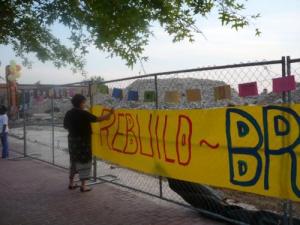 The Parents & Friends of Bruce Monroe, to whom the original promise for a new school was made, continue to work to fulfill that goal and also continue to put pressure on Mayor Vincent Gray, who originally called the slight a “cruel joke,” and today maintains that either Parkview or Bruce Monroe must be closed.
The Parents & Friends of Bruce Monroe, to whom the original promise for a new school was made, continue to work to fulfill that goal and also continue to put pressure on Mayor Vincent Gray, who originally called the slight a “cruel joke,” and today maintains that either Parkview or Bruce Monroe must be closed.
Language Access Youth Advocates Focus on DCPS In March, SMART (Student Multiethnic Action Research Team) student members of Many Languages One Voice (MLOV) met with Michelle Rhee to kickoff a campaign to reduce language access barriers in DCPS schools. Their suggestions including bringing in outside organizations like the LAYC to run stronger after-school programs than the school can provide on its own, and to train students and staff as interpreters so that they can help the schools from the inside to communicate with parents as needed. They also proposed a buddy system for new students. Youth members also launched a blog and testified at City Council oversight hearings to raise awareness about ongoing challenges faced by limited and non-English proficient (LEP/NEP) community members when accessing vital services at government agencies.

S.T.E.P. Up DC Launch Campaign for Student Resource Centers In May, S.T.E.P. Up DC youth held a citywide march at Cardozo High School to kickoff a campaign to win the creation of student resource centers in DC high schools, call for more student support services and raise awareness about the graduation crisis and its impact on the District.
YEA & Radio Rootz Hold Summer Media Intensive Youth Education Alliance and Radio Rootz teamed up for a summer youth media intensive. The youth spent hundreds of hours interviewing, researching, writing and editing a documentary, What’s Next?, on the alarming lack of school guidance counselors in some DCPS high schools.
IMMIGRANT RIGHTS
DC Rejects So-Called “Secure Communities” On July 12th, the DC Council chamber was packed to capacity and charged with excitement. Councilmembers Phil Mendelson and Jim Graham heard over 2 hours of testimony on historic legislation to prevent the DC Metropolitan Police Department (MPD) from sharing arrest data with Immigration and Customs Enforcement (ICE). This legislation, the first-of-its-kind in the nation, was introduced in April in response to MPD’s plans to participate in the falsely-named “Secure Communities” program, a collaboration with the Department of Homeland Security under which fingerprints of everyone arrested in DC would automatically be sent to ICE. “Secure Communities” – a reversal of DC’s 20-year sanctuary policy – was met with an outcry from broad sectors of the community, who argued that it would result in racial-profiling and have a negative impact on community policing. Building on past work fighting criminalization, a coalition quickly formed to fight back. 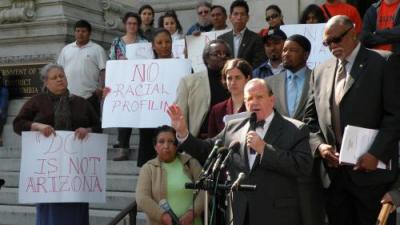 Civil rights and immigrant rights organizations, labor unions, and domestic violence groups took to the streets through “Know-Your-Rights” trainings, radio shows, and advocacy days. While the Chief of Police, Cathy Lanier, held firm in her support for the program, the DC Council responded by introducing the “Secure Communities Act of 2010” to prevent the implementation of the program. Thanks to a week of intense pressure on the Council through email, phone calls, and walks around the Wilson Building, every member of the Council co-sponsored. In the wake of the July 12th hearing, DC MPD sent a letter to ICE formally rescinding their Memorandum of Agreement with DHS, becoming the first jurisdiction in the country to withdraw from Secure Communities and a model for other cities and counties. Since the DC bill was introduced, Arlington, VA, Santa Clara, CA and San Francisco, CA have all formally requested to opt-out of this dangerous program. Dozens of other communities are in the thick of campaigns to end police-ICE collaboration.
Civil rights and immigrant rights organizations, labor unions, and domestic violence groups took to the streets through “Know-Your-Rights” trainings, radio shows, and advocacy days. While the Chief of Police, Cathy Lanier, held firm in her support for the program, the DC Council responded by introducing the “Secure Communities Act of 2010” to prevent the implementation of the program. Thanks to a week of intense pressure on the Council through email, phone calls, and walks around the Wilson Building, every member of the Council co-sponsored. In the wake of the July 12th hearing, DC MPD sent a letter to ICE formally rescinding their Memorandum of Agreement with DHS, becoming the first jurisdiction in the country to withdraw from Secure Communities and a model for other cities and counties. Since the DC bill was introduced, Arlington, VA, Santa Clara, CA and San Francisco, CA have all formally requested to opt-out of this dangerous program. Dozens of other communities are in the thick of campaigns to end police-ICE collaboration.
LABOR & WORKERS
Workers Fight Back for their Pay 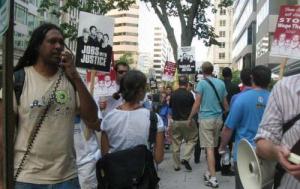 DC Jobs with Justice expanded their battle against Wage Theft in 2010 with a February community hearing that brought together community leaders to hear testimony from workers in every sector of the local economy about the many ways bosses steal wages and to issue a report on the problem. Building off successful efforts to reclaim stolen wages, the Union de Trabajadores de Washington DC, a day labor organization, launched a Labor Rights School that trained workers to be rights defenders– educating others and helping them defend their rights. Members of the Union de Trabajadores successfully recovered thousands of dollars for workers over the course of the year through a combination of direct action and collaboration with the DC Office of Wage-Hour. A new power for workers in DC, the Restaurant Opportunities Center-DC, is joining the fight as well. In August, ROC-DC organized leafleting actions and an online petition that successfully shamed local restaurant Bread and Brew into paying former employee Mya Zeronis her back wages.
DC Jobs with Justice expanded their battle against Wage Theft in 2010 with a February community hearing that brought together community leaders to hear testimony from workers in every sector of the local economy about the many ways bosses steal wages and to issue a report on the problem. Building off successful efforts to reclaim stolen wages, the Union de Trabajadores de Washington DC, a day labor organization, launched a Labor Rights School that trained workers to be rights defenders– educating others and helping them defend their rights. Members of the Union de Trabajadores successfully recovered thousands of dollars for workers over the course of the year through a combination of direct action and collaboration with the DC Office of Wage-Hour. A new power for workers in DC, the Restaurant Opportunities Center-DC, is joining the fight as well. In August, ROC-DC organized leafleting actions and an online petition that successfully shamed local restaurant Bread and Brew into paying former employee Mya Zeronis her back wages.
Washington Hospital Center Nurses Organize for Respect & Quality Care || VIDEO Nurses at Washington Hospital Center (WHC) spent much of 2010 locked in a bitter struggle with management, who proposed drastic pay cuts and taking control of members’ health care plans, and insisted on having the right to make changes without any meaningful input from members. The nurses not only had to fight back against these proposals, which they knew would result in increasing staffing shortages and a lower quality of care, they also had to respond to improper terminations. Management chose to unjustly fire 18 nurses who were unable to get to work during the February 2010 snowstorms that paralyzed the area. Through the work of the union and nurses’ perseverance, 10 of these nurses have returned to work with full back pay, and arbitration is pending for the remaining eight nurses. 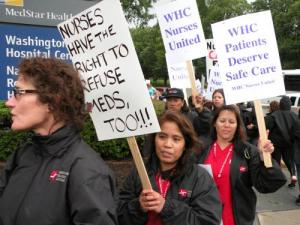 In May 2,000 nurses from around the US joined with WHC nurses for an information picket to support them in the ongoing contract negotiations. Over 1,200 nurses signed a Vote of No Confidence in WHC management in June, to show concern for the safety and quality of patientcare and the worsening work conditions for nurses. In October management unilaterally imposed new terms and conditions of employment on the nearly 2,000 nurses at the hospital, including cutting pay, reducing paid time off and eliminating the labor-management patient-care committee. Nurses responded by stepping up their campaign for respect at the hospital, holding job actions, including a march of over 100 nurses on CEO John Sullivan’s office to deliver the petitions signed by more than 1,200 WHC nurses, and that month nurses overwhelmingly voted for their union to merge with National Nurses United. In an action to highlight that WHC sends profits to its parent corporation, more than a hundred WHC nurses lined the street outside MedStar Health’s Franklin Square Hospital in Baltimore as dignitaries cut ribbons to inaugurate a gleaming new $175 million tower. On November 1, the nurses filed a report with the DC Department of Health detailing dozens of instances of unsafe patient care at WHC, and requested that the DC government investigate and take action. Hundreds of WHC nurses, together with community leaders, marched to the offices of hospital management to hand-deliver the report and urge the hospital not to wait on regulatory action but to negotiate patient care and other concerns with the nurses immediately. And a one-day strike planned for November 24 was cancelled after management agreed to recognize National Nurses United and return to bargaining table. Moving into 2011, their struggle for quality patient care and decent working conditions continues.
In May 2,000 nurses from around the US joined with WHC nurses for an information picket to support them in the ongoing contract negotiations. Over 1,200 nurses signed a Vote of No Confidence in WHC management in June, to show concern for the safety and quality of patientcare and the worsening work conditions for nurses. In October management unilaterally imposed new terms and conditions of employment on the nearly 2,000 nurses at the hospital, including cutting pay, reducing paid time off and eliminating the labor-management patient-care committee. Nurses responded by stepping up their campaign for respect at the hospital, holding job actions, including a march of over 100 nurses on CEO John Sullivan’s office to deliver the petitions signed by more than 1,200 WHC nurses, and that month nurses overwhelmingly voted for their union to merge with National Nurses United. In an action to highlight that WHC sends profits to its parent corporation, more than a hundred WHC nurses lined the street outside MedStar Health’s Franklin Square Hospital in Baltimore as dignitaries cut ribbons to inaugurate a gleaming new $175 million tower. On November 1, the nurses filed a report with the DC Department of Health detailing dozens of instances of unsafe patient care at WHC, and requested that the DC government investigate and take action. Hundreds of WHC nurses, together with community leaders, marched to the offices of hospital management to hand-deliver the report and urge the hospital not to wait on regulatory action but to negotiate patient care and other concerns with the nurses immediately. And a one-day strike planned for November 24 was cancelled after management agreed to recognize National Nurses United and return to bargaining table. Moving into 2011, their struggle for quality patient care and decent working conditions continues.
Ironworkers Strike for Justice 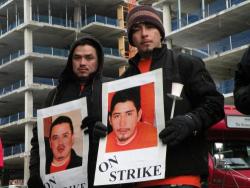 In the face of rising unemployment, a group of ironworkers took a brave stand for justice by walking off the job at Wings Enterprises, the largest rebar company in the DC area. The workers, driven to strike by poverty wages, lack of benefits, concerns over health and safety, and lack of respect on their workplaces, quickly gained the support of the community. Supported by DC Jobs with Justice, students at University of Maryland and George Washington University, several DC Councilmembers, and many local faith leaders, workers organized a relentless campaign, including worksite actions, delegations to Wings’ clients, and meetings with local politicians. Pressure succeeded in forcing the company into mediation sessions with the workers and losing them work on several new projects. IN addition, DC Councilmembers circulated a letter threatening to debar Wings and agencies began investigations of the company. The company was also forced to pay $75,000 to 41 workers they wrongfully fired for supporting organizing efforts.
In the face of rising unemployment, a group of ironworkers took a brave stand for justice by walking off the job at Wings Enterprises, the largest rebar company in the DC area. The workers, driven to strike by poverty wages, lack of benefits, concerns over health and safety, and lack of respect on their workplaces, quickly gained the support of the community. Supported by DC Jobs with Justice, students at University of Maryland and George Washington University, several DC Councilmembers, and many local faith leaders, workers organized a relentless campaign, including worksite actions, delegations to Wings’ clients, and meetings with local politicians. Pressure succeeded in forcing the company into mediation sessions with the workers and losing them work on several new projects. IN addition, DC Councilmembers circulated a letter threatening to debar Wings and agencies began investigations of the company. The company was also forced to pay $75,000 to 41 workers they wrongfully fired for supporting organizing efforts.
LAND & HOUSING
Tenants Win Right to Sue Landlords Over Poor Conditions This past April, two-years into a multi-year campaign to improve rental housing conditions, tenants won the right to sue landlords in DC Superior Court for poor housing conditions. The campaign was spearheaded by the Latino Economic Development Corporation (LEDC), along with other tenant advocates and local tenant leaders and associations. After two city-wide Town Halls, a petition drive, and several City Council visits and hearings, tenants finally have access to the court to take action and get improved conditions in their homes. Previous to this victory, landlords could sue tenants to enforce a rental contract but tenants could not sue the landlord to enforce the same contract. In the Housing Conditions Docket at Superior Court, tenants can bring their case before a judge who can order the landlord to fix any code violations. This new court, along with the city’s proactive inspections program which was started last year, gives tenants powerful new tools for improving and preserving their affordable housing.
2nd Annual Tenant Town Hall || VIDEO 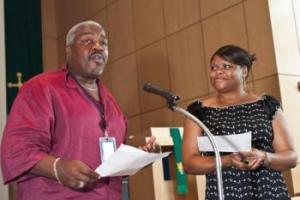 In July, hundreds of tenants and allies gathered at First Trinity Lutheran Church as part of their multi-year campaign to defend and enact new tenants’ rights in the face of rising rents and ruthless displacement tactics by building owners and managers. Councilmembers Graham and Mendelson spoke in support of tenant organizing priorities, two months before the September election, as did several city agency heads. At the event, organized by the Latino Economic Development Corporation, tenants and organizers presented demands to elected officials to continue to improve rental housing conditions. One of the demands won as a result of the event was the creation of quarterly stakeholder meetings for tenants to meet with the Director of the Department of Consumer and Regulatory Affairs to give feedback on the housing inspections and enforcement program. Tenants also called on the Council to allocate more funding for affordable housing programs like the Housing Production Trust Fund. Photo by William Rivas-Rivas (c).
In July, hundreds of tenants and allies gathered at First Trinity Lutheran Church as part of their multi-year campaign to defend and enact new tenants’ rights in the face of rising rents and ruthless displacement tactics by building owners and managers. Councilmembers Graham and Mendelson spoke in support of tenant organizing priorities, two months before the September election, as did several city agency heads. At the event, organized by the Latino Economic Development Corporation, tenants and organizers presented demands to elected officials to continue to improve rental housing conditions. One of the demands won as a result of the event was the creation of quarterly stakeholder meetings for tenants to meet with the Director of the Department of Consumer and Regulatory Affairs to give feedback on the housing inspections and enforcement program. Tenants also called on the Council to allocate more funding for affordable housing programs like the Housing Production Trust Fund. Photo by William Rivas-Rivas (c).
Tenants Buy Their Building and Create the Kenyon Street Yes We Can Cooperative After 8 years of struggle and court battles, the Tenants Association of 1372 Kenyon St NW became the owner of their building. The tenant association had used DC’s Tenant Opportunity to Purchase Act 15 years ago, only to have their share of the building taken away. This Spring the tenants won the right to buy their building back, at a very reduced price, to become the sole owners of the building. They are currently in the process of converting the building into a limited equity cooperative. Located in the heart of Columbia Heights, and surrounded by skyrocketing housing costs, the Tenants’ Association is ensuring that their 18 apartments stay affordable, and that the residents maintain control over their homes. The victory was a real community effort – the tenant association had legal support from the Washington Legal Clinic for the Homeless, UDC Law School and pro bono attorneys and organizing support from the Latino Economic Development Corporation and Empower DC.
Tenants at Riggs Plaza Ensure They Won’t be Displaced by New Development The Riggs Plaza apartments, a large property located close to the Fort Totten Metro, had been slated for redevelopment for several years, along with a large area of new commercial and other space nearby. The property owner promised tenants that they could come back to the new units once they were completed but failed to give tenants any commitments in writing. After several tenants had already relocated to temporary housing, it became clear that there were a lot of unanswered questions and uncertainties. In the fall of 2009, tenants formed an association and started working with tenant organizers from the Latino Economic Development Corporation and lawyers from the Washington Legal Clinic for the Homeless to protect their rights. Several tenants who hadn’t relocated yet, refused to vacate their apartments until Cafritz agreed to negotiate with the association. Tenants met with their Councilmember and ANC commissioners for the neighborhood, who pledged their support. In the end, they won an agreement with Cafritz for ALL the tenants, with written commitments protecting their rights.
Displaced Mt. Pleasant Tenants Secure Purchase Loan In 2008, on the eve of a successful court fight with their slumlord apartment owner, the 3145 Mt. Pleasant Street Tenants Association was dealt a blow by a mysterious fire in the 80-unit apartment building. The building was reduced to a burned-out shell, and nearly 400 residents were displaced. The tenants spent the next two years piecing together temporary housing and recovering from the total loss of their possessions – and organizing. After two and a half years of legal activism and pressure on the Council and mayor in August the tenants secured a loan to buy and the building, and are working with a nonprofit developer to secure redevelopment funds. In their first act as the new owners the tenants renamed the building the Monsignor Oscar Romero Apartments.
Duncan Coop Owners Renovate Apartments, Avoid Displacement In October, ONE DC’s support of Duncan Cooperative (4625 13th Street NW) came to a close with the completion of all renovations to the 24-unit building in Petworth. Previously ONE DC had helped the largely-elderly tenants avoid displacement with technical assistance in their collective purchase of the building. Also, in April, ONE DC held an Emancipation Day event to highlight DC’s history of liberation and resistance. The event was cosponsored with Empower DC, ROC-DC and others, and included publication of a report on the history of collective struggle in the District.
Marbury Plaza Tenants Win After 2-Year Rent Strike 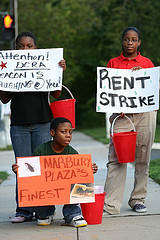 In August, tenants in Southeast won big two years after starting a rent strike to protest dangerous conditions in their building, winning an agreement for $5 million in repairs and rent abatement for the two years the tenants paid into an escrow account. One of the biggest apartment buildings in the District — thousands of people live in the 672-unit building — inspectors found over 800 housing code violations in 2008, the year the rent strike began. The tenants, who teamed up with attorneys at Bread for the City, now have their sights set on fully implementing the agreement. The Marbury Plaza Concerned Tenants Association went on to host the 2nd Annual Tenant Choice Awards the following month at THEARC, celebrating another year of tenants rights victories. Photo by Daniel del Pielago.
In August, tenants in Southeast won big two years after starting a rent strike to protest dangerous conditions in their building, winning an agreement for $5 million in repairs and rent abatement for the two years the tenants paid into an escrow account. One of the biggest apartment buildings in the District — thousands of people live in the 672-unit building — inspectors found over 800 housing code violations in 2008, the year the rent strike began. The tenants, who teamed up with attorneys at Bread for the City, now have their sights set on fully implementing the agreement. The Marbury Plaza Concerned Tenants Association went on to host the 2nd Annual Tenant Choice Awards the following month at THEARC, celebrating another year of tenants rights victories. Photo by Daniel del Pielago.
ONE DC Members Take Back Public Land, Build Tent City || VIDEO 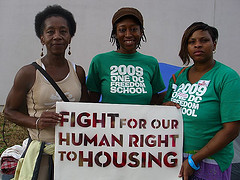 In June, ONE DC members and supporters occupied the vacant lot at 7th St & Rhode Island Ave NW known as “Parcel 42.” To ONE DC members it’s better known as the site of an eight-year struggle to build the first new affordable housing in Shaw in over 25 years. In 2007 Mayor Fenty famously committed to providing a $7.8 million subsidy to build 94 units affordable to families making less than $50,000/yr, and agreed to work with ONE DC members’ chosen developer to break ground. After months of unresponsiveness from the city government, ONE DC members teamed up with Take Back the Land to dramatize the affordable housing crisis by building a Tent City on public land, noting that the right to land & shelter is also a human right. Hundreds of DC residents pitched in to screen films, build a library, host cookouts, poetry readings and other events at the site, including residents of Lincoln Westmoreland and other neighboring apartment buildings. Many camped out in tents, including some DC residents experiencing homelessness. The “intentional community in progress” endured nearly two months, as dramatic evidence of both the Fenty Administration’s priorities and local activists’ resolve.
In June, ONE DC members and supporters occupied the vacant lot at 7th St & Rhode Island Ave NW known as “Parcel 42.” To ONE DC members it’s better known as the site of an eight-year struggle to build the first new affordable housing in Shaw in over 25 years. In 2007 Mayor Fenty famously committed to providing a $7.8 million subsidy to build 94 units affordable to families making less than $50,000/yr, and agreed to work with ONE DC members’ chosen developer to break ground. After months of unresponsiveness from the city government, ONE DC members teamed up with Take Back the Land to dramatize the affordable housing crisis by building a Tent City on public land, noting that the right to land & shelter is also a human right. Hundreds of DC residents pitched in to screen films, build a library, host cookouts, poetry readings and other events at the site, including residents of Lincoln Westmoreland and other neighboring apartment buildings. Many camped out in tents, including some DC residents experiencing homelessness. The “intentional community in progress” endured nearly two months, as dramatic evidence of both the Fenty Administration’s priorities and local activists’ resolve.
DEFENDING SAFETY NET PROGRAMS, CONSUMER PROTECTION & HEALTH JUSTICE
Child Care for All Campaign Blocks Cuts Funding Cuts || VIDEO (GMP) In Mayor Fenty’s first three years in office the childcare subsidy program was slashed $26 million. In his final year, he proposed another $4 million cut to a program that allows thousands of low-income parents to pursue professional and educational goals, and supports a vital workforce of several thousand childcare professions, mostly low-income women of color. The members of Empower DC’s Child Care for All Campaign were determined to put a stop to this devastating trend of cuts. Then-Council Chair Vincent Gray was campaigning for mayor on a platform largely devoted to his early education plans. He warned his constituents and advocates that despite his plans, the budget would be a tough one because of the recent economic downturn. Nevertheless, child care providers, parents, children’s advocates, and even hundreds of children were a constant presence at the Wilson Building throughout the crucial budget advocacy early Spring months. Hundreds of them made calls, wrote letters, testified at hearings, met with council members and staff, led rallies, and protested Fenty’s proposal in an effort to get a firm commitment from Gray that he would not allow it to go forward. One the eve of the council’s vote on the budget, the campaign hosted a community meeting and accountability forum with Gray at St. Philip’s Episcopal Church in Anacostia, whose child care center is a leading member of the campaign. With 100 in attendance and in support of full funding for the Child Care Subsidy Program, Gray committed the Council to restoring $3.5 million of the proposed $4 million cut. In the face of such widespread budget cuts, the campaign welcomed this nearly complete restoration as a victory, thanked Gray for his efforts to reverse Fenty’s bad history with the program, and celebrated a hard fought budget season. Indeed, after four years of cuts averaging $5-7 million/year, the campaign members hope that last year was the beginning of a turnaround and a DC budget that truly prioritizes the needs of low-income families and their children.
Language Access Advocates Organize for Health Justice Members of the DC Language Access Coalitioncontinued to work for implementation of language access programs, including establishment of parent organization Many Languages, One Voice (MLOV) and formation of a Health CommUNITY Club, along with the development of a curriculum for a new health organizing program. The group also incorporated a nail salon outreach initiative focusing on health conditions at DC salons with predominantly immigrant workers. Coalition members also continued to meet with councilmembers and agency staff to press for improved implementation and oversight of existing language access programs.
Activists Defend Consumer Advocate, Defeat Lobbyist Nomination In March an informal coalition of labor unions, environmental groups like Rising Tide and other activists defeated the proposed nomination of a telecommunications lobbyist to be the new watchdog of DC utility companies. The Office of the People’s Counsel safeguards the rights of DC residents with Pepco, Washington Gas, Verizon and others, and has been led for years by stalwart advocate Betty Noel, who the mayor wanted to boot out. Fenty and Councilmember Muriel Bowser nominated Patton Boggs lobbyist Vicky Beasley to take over. Advocates testified at Council hearings and raised awareness through new and alternative media about Bowser’s attempt to fast-track Beasley’s nomination, which was defeated.
Save Our Safety Net & Others Restore $16 Million in Budget Cuts After three months of quiet deliberation and planning, on April 1st Save Our Safety Net launched a campaign to force the City Council to stop budget cuts to safety net programs by raising income taxes 1% on taxpayers making over $200,000 a year through the use of creative direct action alongside more traditional advocacy. The campaign, supported by allies with the Metro Washington AFL-CIO, Fair Budget Coalition, Take Back DC and many grassroots organizations already fighting for more funding for affordable housing, childcare subsidies, job training and other critical programs, succeeded in restoring many of the proposed cuts. (See below for a longer writeup.)
CAMPAIGN STORY: Save Our Safety Net Fights for a Strong Safety Net for All Neighborhoods
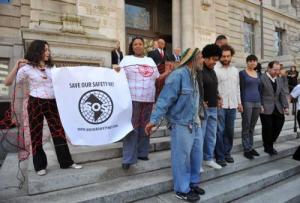 Like the rest of the country, DC has experienced a severe recession for the last 2-3 years. Unlike many states, which have raised taxes on those who can most afford to pay rather than cut critical services to people with the least access to resources, the District has suffered three years of cuts primarily targeting human service programs to make up for lost revenue. This is the story of a few dozen people, many residents new to the District and others who have been fighting for fair spending for years and even decades, who had the vision to see another way out, and the courage to interrupt business as usual.
Like the rest of the country, DC has experienced a severe recession for the last 2-3 years. Unlike many states, which have raised taxes on those who can most afford to pay rather than cut critical services to people with the least access to resources, the District has suffered three years of cuts primarily targeting human service programs to make up for lost revenue. This is the story of a few dozen people, many residents new to the District and others who have been fighting for fair spending for years and even decades, who had the vision to see another way out, and the courage to interrupt business as usual.
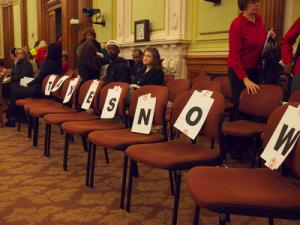
Having not heard back from the mayor, and knowing from inside sources that he would again focus on cuts, on April 1st SOS members interrupted Fenty’s budget announcement press conference, holding up a red net, wearing “Save Our Safety Net” t-shirts and chanting their demands to stop the cuts. Although it did get them attention, it didn’t change his mind. He still wasn’t interested in hearing from the public. So at the Council hearing where Fenty introduced the budget, April 12th, SOS and allies from the Metro Washington AFL-CIO and others packed the house. When it was his turn to speak, over 100 people stood up on cue, and walked out (VIDEO), leaving a note printed on the backs of their chairs: “NEW TAXES NOW.” In the hallway they held their own speakout and rally, and prepared to focus on the people who could make new taxes a reality, the City Council.
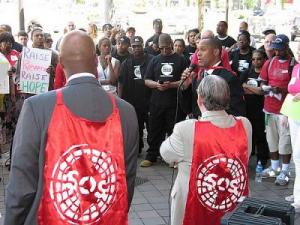 As the budget process unfolded, SOS members knew they had to do more than shame the villains – chiefly Mayor Fenty and Councilmember Evans. They had to call out those councilmembers willing to take political risks to be safety net superheroes. And so on May 5th they held a “caping,” assembling over 100 advocates along with the Fair Budget Coalition at the front steps of the Wilson Building to present embroidered “SOS” superhero capes to councilmembers Michael Brown, Graham, Wells and Thomas (Barry got one eventually, too), following a week of Council visits by volunteers encouraging councilmembers to “take the cape.” Councilmember Kwame Brown was also targeted this way through a Twitter e-action, emails and calls.
As the budget process unfolded, SOS members knew they had to do more than shame the villains – chiefly Mayor Fenty and Councilmember Evans. They had to call out those councilmembers willing to take political risks to be safety net superheroes. And so on May 5th they held a “caping,” assembling over 100 advocates along with the Fair Budget Coalition at the front steps of the Wilson Building to present embroidered “SOS” superhero capes to councilmembers Michael Brown, Graham, Wells and Thomas (Barry got one eventually, too), following a week of Council visits by volunteers encouraging councilmembers to “take the cape.” Councilmember Kwame Brown was also targeted this way through a Twitter e-action, emails and calls.
With energy and endorsements of their demands growing, the group continued to organize Ward-based teams to visit councilmembers, reached out to crucial organizational allies like Take Back DC and collected petition signatures and passed out leaflets, sometimes wearing “safety net superhero” costumes. They also held dinner parties, happy hours and at least one fundraiser with local hip-hop artists including DC’s Head-Roc. The momentum was surging, and the campaign prompted a public conversation about who should bear the brunt of the recession, visibilized with the spotlight of creative direct action. In meetings with councilmembers, which often included members of Empower DC and other partner groups, many pledged support. SOS knew that getting them to stick to those behind-closed-doors pledges would be another matter.
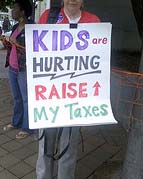 Wealthy residents helped out as well, serving on the campaign steering committee and organizing other high-income earners through groups like Resource Generation. They co-hosted a breakfast meeting with Councilmember Michael Brown for high-income taxpayers, and several wrote letters to the Washington Post and other media outlets pointing out how little they were being asked to pay.
Wealthy residents helped out as well, serving on the campaign steering committee and organizing other high-income earners through groups like Resource Generation. They co-hosted a breakfast meeting with Councilmember Michael Brown for high-income taxpayers, and several wrote letters to the Washington Post and other media outlets pointing out how little they were being asked to pay.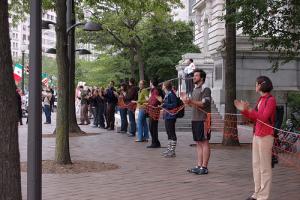 Although they were optimistic, SOS activists organized their most visible action to date the morning of May 19th, the first day of the Council budget debate, building (VIDEO) a human safety net 200 people strong around the entire Wilson Building to make visible the impact of cutting safety net programs that tie together the strongest neighborhoods.
Although they were optimistic, SOS activists organized their most visible action to date the morning of May 19th, the first day of the Council budget debate, building (VIDEO) a human safety net 200 people strong around the entire Wilson Building to make visible the impact of cutting safety net programs that tie together the strongest neighborhoods.
It was not enough. They fell two votes short, 5-7, following a heated debate among councilmembers. Councilmembers Graham, Michael Brown, Wells, Thomas and Barry all earned their capes that day, with thousands of District residents standing behind them.
